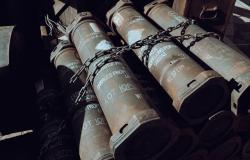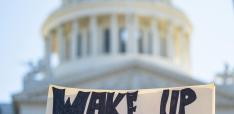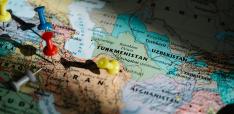Hans Blix | The search for weapons of mass destruction

Pelle Axelsson interviews the well known WMD hunter.
Hans Blix was born in Uppsala in 1928. He studied law at Uppsala University and later continued his studies at Cambridge University and Stockholm University, where he also obtained his PhD and became a professor of international law. His long career began as an expert in international law at the Ministry of Foreign Affairs and continued with political roles through the Liberal Party as state secretary and foreign minister before he took over as director general of the IAEA in 1981. In January 2000, Blix became chairman of the UN inspection commission UNMOVIC, tasked with investigating Iraq’s alleged possession of weapons of mass destruction, which ultimately could not be proven. In 2004, he published the book Disarming Iraq, which describes his time in the international political arena. This year, Hans Blix turns 95 and plans to release a new book, A Farewell to Wars: The Growing Constraints on Interstate Use of Force.
What exactly are weapons of mass destruction?
– Primarily, it refers to nuclear weapons, but biological and chemical weapons are also included in the concept. WWe have not seen biological weapons come into use in modern times, probably because they would be difficult to use militarily. Chemical weapons are also complicated and have not been used on a particularly large scale. However, we saw them used in Iraq, when Saddam Hussein used them both against Iran and against the Kurds in Halabja. In Syria, both the government side and the rebel side used chemical weapons. There is an ongoing discussion about how cyber attacks should be considered. They can be used to shut down a country’s communication and electricity supply. NATO has stated that cyber attacks can be considered an “armed attack.”
How are these types of weapons regulated internationally?
– There are conventions against biological and chemical weapons. They prohibit both the use and possession of such weapons. For nuclear weapons, it is different. There is the non-proliferation treaty, which aims to prevent countries from owning nuclear weapons. However, exceptions are made for countries that already possessed nuclear weapons at the time of the treaty’s creation. They tend to see it as having a free nuclear license.
When you were appointed to lead the inspections in Iraq in January 2000, much had already happened in the issue during the 90s. There were inspections, weapon declarations, military attacks during Operation Desert Fox, and so on. Can you tell us about the most important events leading up to your appointment?
– It began with Iraq’s attack on Kuwait in 1990. In 1991, the United Nations Security Council decided that intervention was by any means necessary. US President George Bush Sr. was tasked by the Security Council and it was the US that led the war against Saddam Hussein. The resolution meant that Iraq’s occupation of Kuwait was to be undone. This was achieved relatively quickly, with the help of many states, including Syria and Arab states in the operation. It was a big success. However, there were divisions within the US regarding whether to stop at driving out the Iraqis or to go further and remove Saddam Hussein from power. President Bush Sr. decided on the former, i.e. what the Security Council had requested and nothing more.
– The Security Council decided that Iraq should also be disarmed. Therefore, they tasked us at the IAEA to inspect and dismantle all nuclear capacity in Iraq. When it came to the disarmament of chemical and biological weapons, as well as missiles, the newly created commission UNSCOM was tasked with the job, led by Rolf Ekéus at the time. The division of tasks between the IAEA and UNSCOM was due to a controversy in Washington. Some were mistrustful of the IAEA, believing that the organization had missed what Saddam was up to. At the same time, there were others who believed that if the IAEA was removed from this task, the organization’s authority would be seriously weakened, and therefore this agreement was reached. Ekéus and I also cooperated, although we had our differences.
Something that hasn’t received enough attention is the fact that Iraq destroyed most of its weapons already in 1991. Some chemical weapons were retained, but these were declared to UNSCOM and later destroyed. UNSCOM never found any hidden or undeclared weapons during the 90s. They found installations that had produced biological weapons, just as we found installations that had been for the nuclear program. These installations were destroyed. If it was the case that the Iraqis themselves destroyed everything in 1991, one naturally wonders why they didn’t declare it, and why they didn’t invite inspectors to witness it. I think there is a psychological explanation, that it was embarrassing and painful to see their own production destroyed. I got that impression reinforced in 2003 when we ordered the Iraqis to destroy missiles that had longer range than what was allowed. It was very difficult for them to agree, but when they did, they expressed a wish to me that we would at least refrain from photographing. I interpreted that as being emotionally painful for them.
– In 1998, Iraq stopped all inspections and all inspectors left the country. To punish the Iraqis, the British and Americans began bombing the country for four days, under the name Operation Desert Fox. Why did Iraq stop the inspections if they had nothing to hide? One fact to consider is that they never stopped IAEA inspectors, only UNSCOM’s inspectors. My interpretation was that UNSCOM’s inspections were sometimes humiliating and the inspectors behaved aggressively and militaristically. We at the IAEA approached inspections with smaller groups and a less confrontational attitude. My conviction was that we would make more progress with a correct attitude. Ekéus saw new inspections as a continuation of the war. I saw them as the beginning of peace.
No hidden weapons of mass destruction were found during the inspections of the 90s, but suspicions persisted as Iraq stopped the inspections. You were then tasked by the UN Security Council to lead the newly formed UNMOVIC to continue the search for weapons of mass destruction after UNSCOM was disbanded. What caused the Iraqis to resume cooperation?
– An important event was the terrorist attack on the World Trade Center in 2001. It changed the attitude of the United States, and the American faction that believed it was necessary to get rid of Saddam grew. They claimed to know that he had connections with Al-Qaida, which was not the case. However, Britain and Tony Blair did not want to intervene without the Security Council’s permission to remove Iraq’s government, instead following the method used in Yugoslavia when Milosevic was overthrown. If Iraq had continued to deny entry to inspectors or block them from their work, such permission might have been given, which was probably the hope of the United States and Britain. To their – one must assume – disappointment, the Iraqis then began to cooperate. Admittedly, it was meager and reluctant at first, which I also pointed out in a speech at the end of January 2003, where I was quite tough on Iraq. The United States’ accelerating military pressure on Iraq and my high tone seemed to have an impact on the Iraqis, who became much more cooperative.
– As the cooperation with the Iraqis improved, the tone of my reports also changed. The US, who was waiting for a reason to enter the country, of course did not appreciate this and the pressure on me increased. I did not have time to read everything that was written, but my press secretary, who read everything, summarized the criticism for me: they are eating you alive! Many asked why I shifted from strong criticism to speaking more positively about the cooperation. The answer is that we had the mission to inspect professionally and report to the UN Security Council, and that was what we did.
Many theories abound about the Americans’ motivation to invade Iraq. What can you see as their incentives? The commonly held explanation is that they wanted to seize Iraq’s oil, is there any truth to it?
– For President George H.W. Bush, oil may have certainly played a role in the decision to stop Iraq’s invasion of Kuwait, but when his son, President George W. Bush, invaded, I don’t think it had much to do with oil. He himself pointed to the threat of terrorism and claimed that Saddam had ties to terrorist organizations. The United States also believed they could introduce democracy to the region, which was naive. Finally, they wanted to protect Israel. My theory is that it was more of a direct consequence of the 9/11 terrorist attacks. The United States was like a giant gorilla wounded by a small arrow from a pygmy. It was a humiliation. They needed to strike back at someone, and the Taliban in Afghanistan were not enough. They needed to go on to the Axis of evil.
– There is an interesting similarity between the US perception before the invasion of Iraq and Putin’s perception before the invasion of Ukraine. The Americans believed that the Iraqis would throw flowers at their tanks as they rolled in, just as Putin imagined the Ukrainians would do. Both cases were examples of a lack of critical thinking and analysis.
From a scientific perspective, one can argue that it is impossible to prove that something does not exist. Either you find what you are looking for or you can always search more.
– That’s right, and Donald Rumsfeld put it a little amusingly: “The absence of evidence is not the evidence of absence.” He was certainly right, but my response to him was: “It’s also not the evidence of presence.”
In your book, you often emphasize the importance of keeping UNMOVIC independent from individual countries and their intelligence services, especially the American one. Was there anything you saw as a key factor in succeeding with the mission?
– Yes, for credibility. We knew that UNSCOM had been infiltrated and Ekéus had publicly spoken about the pressure they were under. The only real friction that arose between me and the American administration, Collin Powell and Condelezza Rice, was that they wanted an American employed close to me in the office. One of the first things I did when I took office was to ask the vice chairman, who had previously worked directly under Ekéus, to resign. He was very competent, but I did not want an American as vice chairman. Nor did I want a Russian, Frenchman or Englishman for that matter. All credibility would have been lost if they had gotten what they wanted. If Blix had capitulated to the Americans, it would have been said.
– Nobody ever criticized us for incompetence in the inspections. UNSCOM had all kinds of experts that they had gotten from the CIA, and sure they were competent, but they often had dual loyalties too. When I was asked about the competence within UNMOVIC at one point, I replied: “I cannot assure you that they are the world’s brightest, but I can assure you that they are in nobody’s pocket.”
Can it be argued that the Iraqi regime had the opportunity to avert the invasion by showing more cooperation and clarity? To some extent, was it their own fault?
– Yes, one could say that. They clearly woke up too late. During the fall of 2002, I contemplated the possibilities of getting the Iraqis to once again declare all their weapons. Therefore, I did not oppose the resolution pushed through by the US, which demanded a new declaration since the one from 1991 was incomplete and deceptive in several aspects. I saw that as an opportunity for them to get out of this situation. But when it finally came in, it was 12,000 pages without much new; most of it was copies of old reports. I was very disappointed then. At the same time, the difficulty for them was how to declare something they did not have, which is not so easy!
This summer, you are releasing a new book, A Farewell to Wars. What can you tell us about it?
– That’s correct, with the subtitle “The Growing Constraints on Interstate Use of Force.” I am referring to the fact that nuclear powers are beginning to view war as too dangerous, while mutual interdependence is increasing significantly around the world and popular resistance to war is growing stronger. Prior to the establishment of the League of Nations, there was actually no prohibition on the use of war. In the 1800s, it was still seen as glamorous. States were eager to seize territory from others and colonialism was in full swing. The old Roman maxim was that if you want peace, prepare for war. But I object to that now, given how much has changed in the world. An example I have in the book is the fact that no one talks about a “war department” anymore; it’s called the “defense department” all over the world.
– Regarding nuclear weapons, I believe they are a terrible threat because mistakes can always happen, which could result in a nuclear war. At the same time, it is clear that nuclear weapons have led to restraint, not only in terms of avoiding escalation, which is a factor in Ukraine right now, but also the fear of starting new conflicts. The Russians are certainly showing that they dare to balance on the brink of the abyss. However, I believe that overall, Russian behavior does not break the trend, but is rather an irrational deviation from the curve. I will continue to argue that the world is moving away from kinetic wars. It will transition to competition using other means, such as economics through sanctions and information through cyber attacks.
What book would you recommend?
– An interesting book I recently read by two professors from Yale, The Internationalists, which is about the Kellogg-Briand Pact.
Pelle Axelsson, a Swedish journalist and founder of intellectinterviews.com. He has many years experience from interviewing experts and intellectuals and his broad range of interests span from international affairs, world politics and diplomacy to history, technology and religion.
This first appeared on IntellectInterviews and was repost with permission.
Photo by Yena Kwon


